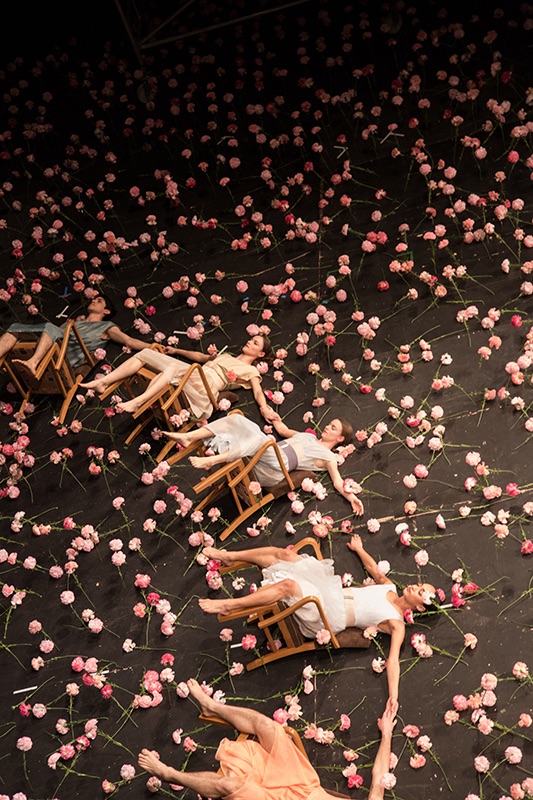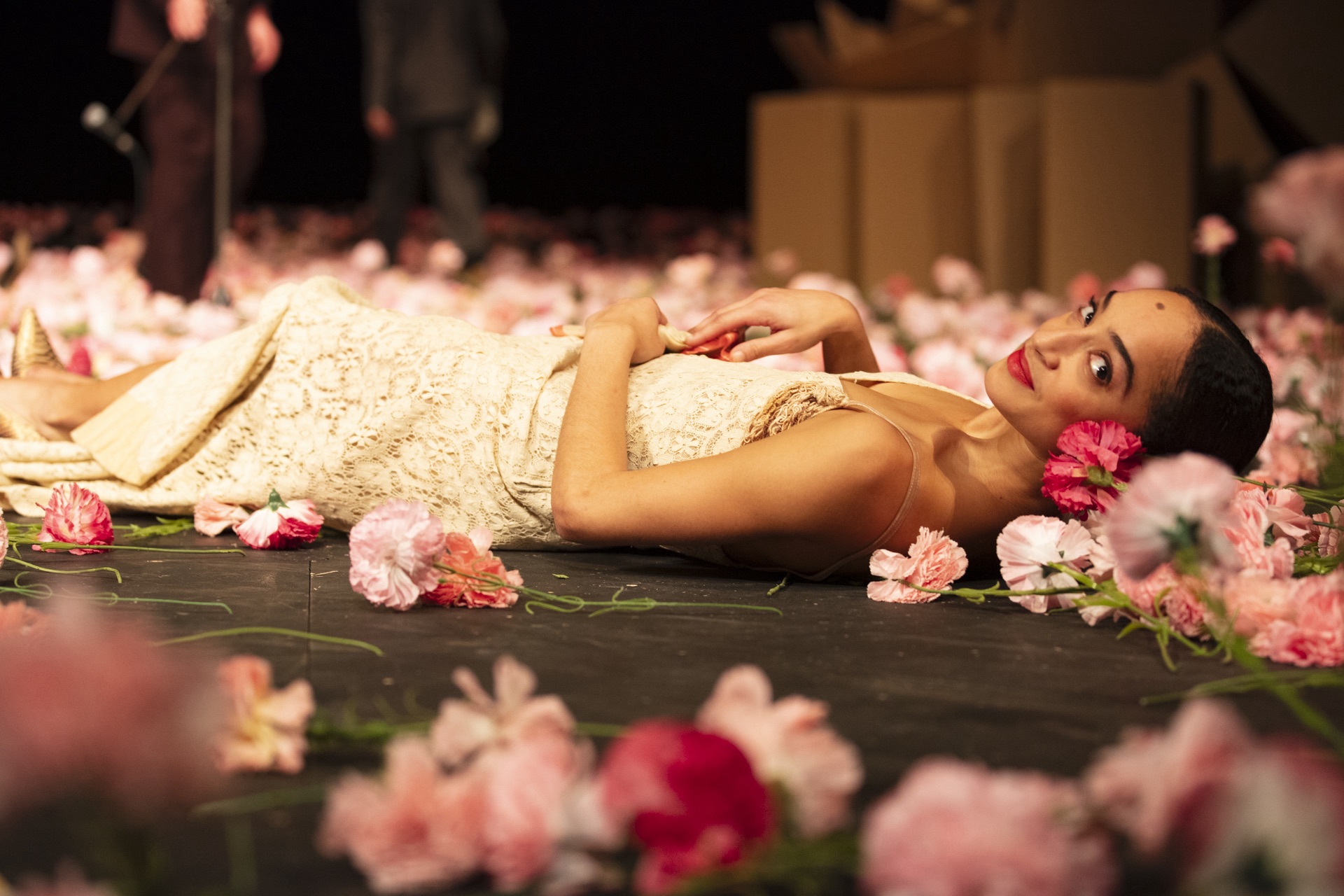Words by Bengi-Sue Sirin.
Every few Februarys, a special circus comes to town. They are theatrical, acrobatic, and very, very funny. The current ringmaster is Boris Charmatz, an experienced artistic director from France. This troupe’s ensemble are very international, from all corners of the globe. But their origin is Wuppertal in West Germany, the base of their legendary founder, grand dame of dance, Pina Bausch.
This year audiences at Sadler’s Wells are spoiled. The offering is Tanztheater Wuppertal’s Nelken (meaning Carnations), a piece that has enchanted for forty-two years since its premiere in 1982. Several elements are feted; from the stunning visuals of its 8000 strong carnation-adorned stage floor, to the simple power of the Nelken Line, a walking motif which incorporates four Sign Language-esque movements indicating the four seasons. This 2024 run is the first since Bausch passed away in 2009, and the packed theatre is testament.
As with all Bausch’s work that I have seen, I can’t pin it down. I experience Nelken as scenarios that connect in rich, unexpected ways; scenarios of movement, of connection, of surprise, delight and sadness. Nelken is a one hour and fifty minute long performance with no interval, and its richness seeps all the deeper for it. And that one hour and fifty absolutely flies by!
The show doesn’t open with a curtain. Instead, as soon as you walk into the auditorium, you see the beautifully beflowered stage. It is as though the entire theatre is the Bauschian realm, with no separation between yourself and the dance. This resonates right from the very start as just a couple of minutes in, dancers are already making their way down to the audience and prising some audience members from their seats and seemingly away from the show. A man near me is asked politely, “Would you mind coming this way, Sir?” It is cheeky and hilarious.
Then, something I especially enjoy. With commanding yet deadpan presence, Reginald Lefebvre performs Gershwin’s ‘The Man I Love’ in Universal Sign Language. Alone amongst the carnations, with the typically Bausch crooner blasting in the background, it is a marvellous little vignette, making me feel the same sorts of depths of feeling as an Aki Kaurismaki film. I loved it.
Another scenario teetering between sweetness and sadness entailed the dancers seemingly revisiting the despairs of their childhood. One woman relates, as though she was a little girl again, arguments between her parents. Another dancer frantically and desperately jumps onto the motionless body of someone representing a parent figure, the lack of response painfully at odds with the height of feeling. Bausch was a great prompter of her dancers, known for asking them questions that would elicit movement-inspiring emotional responses. Much of what we see on stage tonight is from the heart of her Tanztheater. It is raw and beautiful.
There is ugliness and spikiness, too. Four alsatians (yes, the dog!) bark at the borders of a particularly prescient scene, the relevance of which has sadly only enhanced since Nelken was first shown 42 years ago. Dancers just walking innocuously across the stage, towards another or alone, are stopped and harangued for their passports by an intimidating man in a suit. He barks himself, asking them ridiculous questions (“How do you say ‘dog’ in French?” is seriously the benchmark) in allusion to the inhumane side of borders and bureaucracy. Simon Le Borgne is made to literally imitate the animals to prove he knows them, dancing himself into a frog-hopping frenzy that makes me feel so sorry for him. The passport motif comes up a few times through Nelken and serves as antidote to the joy and laughter. Bausch is so clever at many things, but I think it is her balance of feeling that always impresses – and shocks – me the most.
Lightness comes in the form of a game of Grandma’s Footsteps. Lefebvre acts as the [pretty authoritarian] Grandma, facing us when he counts so we have full fourth-wall view of the creeping hopefuls. Lefebvre really drags out the power, setting up some hilarious retorts from the others. It is Taylor Drury’s hilarious shoulder-mounted giantess that really steals his thunder though, her terrific coordination and acting proving that you should never expect a Bausch dancer to be a voiceless dancing body.

All of the company are marvellous and multifaceted dancing bodies, of course. But Nelken demands some expert outsider help in one aspect; the infamous scaffold-jump. For this, four suited and booted stuntmen are drafted in, looking every inch Reservoir Dogs. They are not only seen to jump; Nelken folds them into most of the piece. There is a brilliant scene where they use a table and their impressive stuntman leap skills to intimidate Aida Vainieri, who is just trying to sit down and enjoy her snacks in peace… During the standing ovation I notice the four of them grinning – it seems they enjoyed the experience with Tanztheater Wuppertal as much as we did!
There is simply so much to adore in Nelken – it is unendingly rich – but I can’t omit the onions. Yep – onions! They are frantically chopped onstage and used to plunge various faces into. The main feeling that I experience at this moment is ‘Can that really be onions?’, it is visceral and raw in a wholly different way (literally raw too!) But onto the onion-cluttered stage steps a beautiful dancer, wearing an accordion like a dress, to teach us the four gestures of the Nelken Line. And then comes the Nelken Line itself! I am sure anybody who has seen Wim Wenders’ fabulous documentary Pina appreciates it already, but I must say that seeing it in the flesh, hearing the footsteps of the dancers as they stroll with that unique and coy quiet confidence, is just another level of brilliant. It is joyful, simultaneously filled with the innocence of childhood and the assuredness of adulthood, Bausch in a nutshell. And amongst a field of nelken too!
I think Nelken was the perfect Valentine’s Day show. I went with my partner, and there were so many moments I squeezed him knowingly, smiled across a look of, “That’s exactly it!” Yes, Nelken is not without sadness and darkness, and humans being cruel. But it is above all an outpouring of emotions, and a great many of those are funny and warm and loving. The beauty of the carnations did not diminish because they were inevitably crushed throughout. I think it intensified. And I think that’s exactly what Pina Bausch thought as well.
Header by: Paul Andermann.
